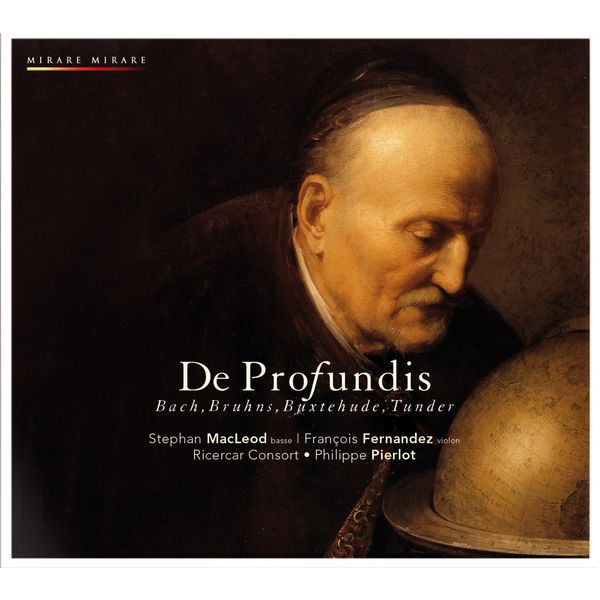
Musique illimitée
Écoutez cet album en haute-qualité dès maintenant dans nos applications
Démarrer ma période d'essai et lancer l'écoute de cet albumProfitez de cet album sur les apps Qobuz grâce à votre abonnement
SouscrireProfitez de cet album sur les apps Qobuz grâce à votre abonnement
Téléchargement digital
Téléchargez cet album dans la qualité de votre choix
The solo cantata repertory of northern Germany in the late seventeenth century took a long time to reach the realm of recordings, and now that it has it is regularly yielding new treasures. Various works by Dietrich Buxtehude have been recorded; here he is represented by a single work and is joined by his student Nikolaus Bruhns and his father-in-law, Franz Tunder. The pieces evolved in the direction of simplicity and intensity, under the influence of the religious ideas collectively known as Pietism. Italian aria styles with their regular structure and smooth melodies made their way across Germany during this period, only to be met by German poetry and its assortment of rules and rhetorical figures. The collision resulted in a level of creative tension that generated deeply felt works in a region devastated by war. The flavor of the music is given right out of the blocks in the title track, Bruhns' De Profundis (track 1), with its spectacular rising melisma at the words "De profundis clamavit" (Out of the depths I have cried). The booklet identifies some of the rhetorical figures found in the music throughout; their effect is not to restrict the music but to intensify it. Swiss-born bass Stephan MacLeod delivers power on a small musical scale, and the Ricercar Consort, featuring director François Fernandez on the violino piccolo, brings warmth and intimacy on historical instruments. This music was ignored perhaps because it does not lead directly to Bach, but it has a great deal to tell the listener about German Protestantism and its musical impulses. A superb disc of solo sacred music. Notes are in French, English, and German.
© TiVo
Vous êtes actuellement en train d’écouter des extraits.
Écoutez plus de 100 millions de titres avec votre abonnement illimité.
Écoutez cette playlist et plus de 100 millions de titres avec votre abonnement illimité.
À partir de 12,49€/mois

Chronique
The solo cantata repertory of northern Germany in the late seventeenth century took a long time to reach the realm of recordings, and now that it has it is regularly yielding new treasures. Various works by Dietrich Buxtehude have been recorded; here he is represented by a single work and is joined by his student Nikolaus Bruhns and his father-in-law, Franz Tunder. The pieces evolved in the direction of simplicity and intensity, under the influence of the religious ideas collectively known as Pietism. Italian aria styles with their regular structure and smooth melodies made their way across Germany during this period, only to be met by German poetry and its assortment of rules and rhetorical figures. The collision resulted in a level of creative tension that generated deeply felt works in a region devastated by war. The flavor of the music is given right out of the blocks in the title track, Bruhns' De Profundis (track 1), with its spectacular rising melisma at the words "De profundis clamavit" (Out of the depths I have cried). The booklet identifies some of the rhetorical figures found in the music throughout; their effect is not to restrict the music but to intensify it. Swiss-born bass Stephan MacLeod delivers power on a small musical scale, and the Ricercar Consort, featuring director François Fernandez on the violino piccolo, brings warmth and intimacy on historical instruments. This music was ignored perhaps because it does not lead directly to Bach, but it has a great deal to tell the listener about German Protestantism and its musical impulses. A superb disc of solo sacred music. Notes are in French, English, and German.
© TiVo
À propos
- 1 disque(s) - 8 piste(s)
- Durée totale : 01:06:01
- Artiste principal : Philippe Pierlot
- Compositeur : Various Composers
- Label : Mirare
- Genre : Classique
 Pourquoi acheter sur Qobuz ?
Pourquoi acheter sur Qobuz ?
-
Streamez ou téléchargez votre musique
Achetez un album ou une piste à l’unité. Ou écoutez tout notre catalogue en illimité avec nos abonnements de streaming en haute qualité.
-
Zéro DRM
Les fichiers téléchargés vous appartiennent, sans aucune limite d’utilisation. Vous pouvez les télécharger autant de fois que vous souhaitez.
-
Choisissez le format qui vous convient
Vous disposez d’un large choix de formats pour télécharger vos achats (FLAC, ALAC, WAV, AIFF...) en fonction de vos besoins.
-
Écoutez vos achats dans nos applications
Téléchargez les applications Qobuz pour smartphones, tablettes et ordinateurs, et écoutez vos achats partout avec vous.



